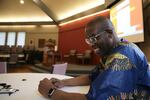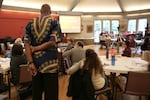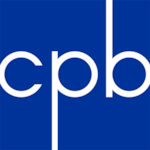After the 2016 presidential election, David Campt realized America had a bigger problem than he’d thought.
“Before the election I perceived, ‘Oooh there’s a whole bunch of angry white people, and Trump represents their anger. And man, they are about to lose big,” he said.
“After Trump won, I realized we’ve had a massive white ally fail, because look what happened: He won by essentially 77,000 votes, and there’s a whole bunch of 'woke' white folk who didn’t talk to people in their own family about a candidate who represented something a lot of people felt but was clearly at least racially problematic.”

David Campt, founder of the White Ally Toolkit, laughs during a recent workshop at the Unitarian Universalist Church of Vancouver, Washington.
Erica Morrison / OPB
Campt wants to change that. He’s traveling the country leading a program called the “White Ally Toolkit.” The goal is to teach white people who believe racism is real to talk to white racism skeptics, people who think racism never matters.
“If white folks not having a race conversation is what produced what might ultimately be a catastrophic result — or at least a difficult result — then maybe we need to upgrade people’s capacity to have that conversation,” he said.
Campt started the classes after President Trump’s victory, but he says the classes have no partisan tilt in either direction.
The real motivator is this statistic he shares with his attendees over and over again: “55 percent of white people will say that racism against whites is at least as big a problem as [racism] against people of color.”
Campt has been facilitating difficult conversations for more than 25 years, including as an advisory board member for President Bill Clinton's Initiative on Race.
Campt said many people of color are impatient with white allies these days. He said they tell well-meaning white progressives, “You need to go do your own work in your own community, and I’m not going to tell you how to do it.”
This is where Campt says he comes in. His job, as he sees it, is to help white people talk to other white people about race in a constructive way.
“I’ll show you how,” he said. “I won’t necessarily tell you how to sit in the room with Keisha and make sure that conversation goes well. But I will tell you how to have a conversation with Skyler, your cousin, and have a different kind of conversation that doesn’t avoid racial issues and doesn’t make either of y’all feel bad.”
He boils the approach he wants white allies to take down to an acronym: RACE, or “reflect, ask, connect, expand.”
Campt came to the Pacific Northwest this winter to teach the class, which costs participants $30 to $45. The choice of locations wasn’t a coincidence, he said; Portlanders tend to be liberal, white and worried about making sure Oregon’s historically racist reputation does not continue to define it.
“What I’m trying to get people to do is to have their list of people they are working on this year,” he said. “They are going about that systematically as well as looking for the random moments that happen at the cocktail party or around the water cooler …
"That’s why it’s a toolkit. They need to have their arsenal of stories and anecdotes that they call on to be ready for a variety of different things and a plan to take people up a ladder of understanding.”

David Campt listens to as attendee of his White Ally Toolkit workshop shares her experience with racism skeptics at the Unitarian Universalist Church of Vancouver on February 17, 2018.
Erica Morrison / OPB
Some of his Pacific Northwest students have already put their tools to work.
Sharon Toliver, a social work student at Eastern Washington University, attended part one of the course at the Unitarian Universalist Church of Vancouver in December and returned for part two with a story about how she used the “connect” method to talk with her father about immigration over the holidays.
They were discussing the uncertain future of the Deferred Action for Childhood Arrivals program and her father’s frustration with immigrants who entered the country illegally with small children.
“I don’t know how we got on the topic, but we were discussing ‘Dreamers,’ and I was able to use what I was taught to find that common ground,” she told the room of mostly older white liberals at a Feb. 17 class.
Related: A Black Comic In Oregon Tells — And Rethinks — Jokes About Race
“To kind of bring in that fact that you know, he would do anything for me whether it was legal or not if it was for the better. Why is he mad that other parents did that for their children?”
Campt asked Toliver how her father responded.
“I don’t know if I changed his mind at all, but I do think he went away thinking, ‘Hmmm, that is a point that I can’t dispute,’” she said.
Campt’s goal is to change that statistic he cites so often. If 55 percent of white Americans deny that racism hurts people of color today, he'd like to get that number down to 45 percent by 2025.
He says doing that can help make other uncomfortable conversations easier:
“If we can work through America’s original sin and not have white people divided about it and have them acknowledge that racism is an actual thing … maybe we can start talking about issues around climate change, abortion, issues around gun control,” he said.

Sharing America: A Public Radio Collaboration
Erica Morrison is part of the public radio collaborative “Sharing America,” covering the intersection of race, identity and culture. This new initiative, funded by the Corporation for Public Broadcasting, includes reporters in the Northwest and Hartford, Connecticut, St. Louis and Kansas City. You can find more "Sharing America" coverage here.

